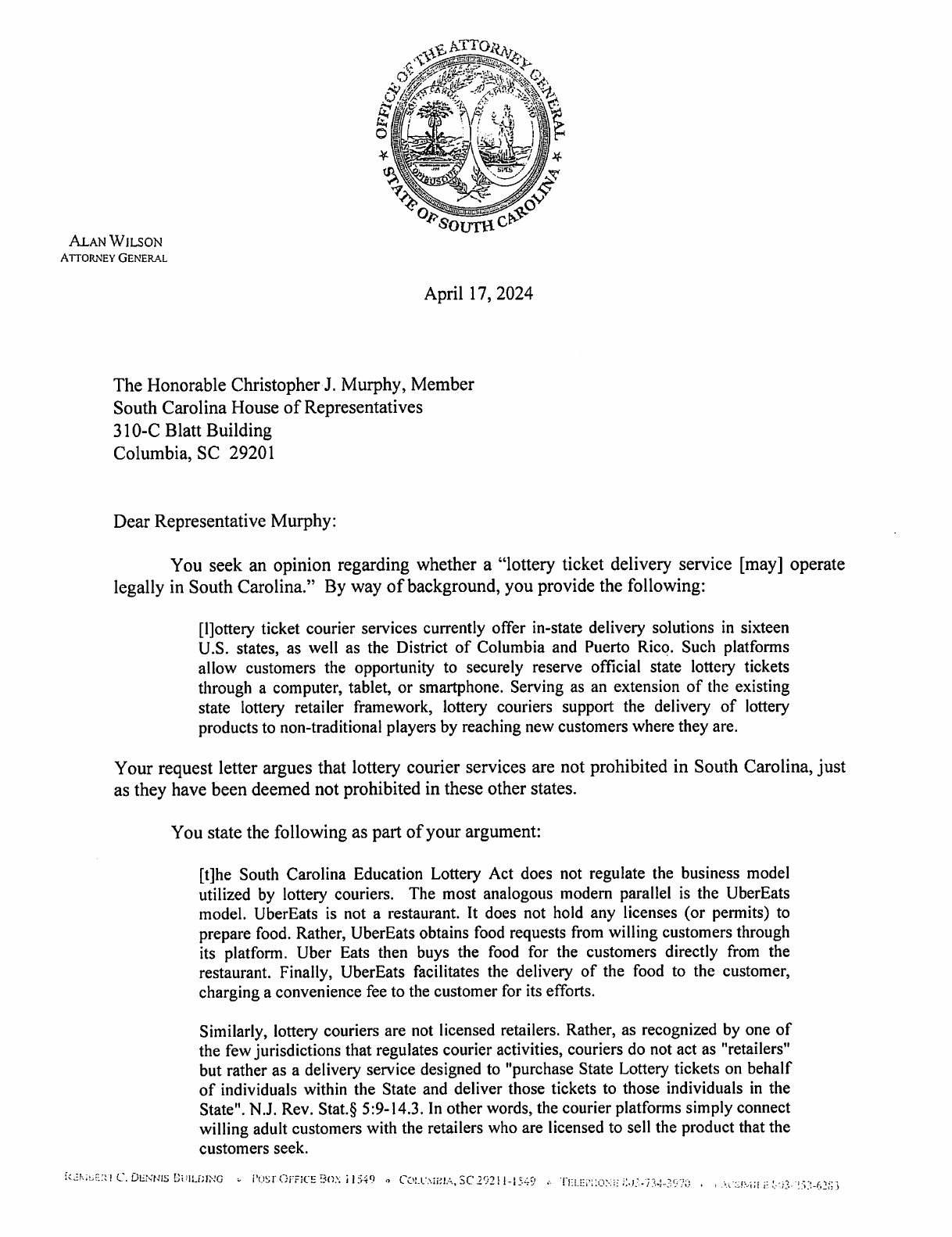
April
17,
2024
Dear
Representative
Murphy:
You
state
the
following
as
part
of
your
argument:
The
Honorable
Christopher
J.
Murphy,
Member
South
Carolina
House
of
Representatives
3
1
0-C
Blatt
Building
Columbia,
SC
29201
Your
request
letter
argues
that
lottery
courier
services
are
not
prohibited
in
South
Carolina,
just
as
they
have
been
deemed
not
prohibited
in
these
other
states.
You
seek
an
opinion
regarding
whether
a
“lottery
ticket
delivery
service
[may]
operate
legally
in
South
Carolina.”
By
way
of
background,
you
provide
the
following:
[l]ottery
ticket
courier
services
currently
offer
in-state
delivery
solutions
in
sixteen
U.S.
states,
as
well
as
the
District
of
Columbia
and
Puerto
Rico.
Such
platforms
allow
customers
the
opportunity
to
securely
reserve
official
state
lottery
tickets
through
a
computer,
tablet,
or
smartphone.
Serving
as
an
extension
of
the
existing
state
lottery
retailer
framework,
lottery
couriers
support
the
delivery
of
lottery
products
to
non-traditional
players
by
reaching
new
customers
where
they
are.
Similarly,
lottery
couriers
are
not
licensed
retailers.
Rather,
as
recognized
by
one
of
the
few
jurisdictions
that
regulates
courier
activities,
couriers
do
not
act
as
"retailers”
but
rather
as
a
delivery
service
designed
to
"purchase
State
Lottery
tickets
on
behalf
of
individuals
within
the
State
and
deliver
those
tickets
to
those
individuals
in
the
State".
N.J.
Rev.
Stat.§
5:9-14.3.
In
other
words,
the
courier
platforms
simply
connect
willing
adult
customers
with
the
retailers
who
are
licensed
to
sell
the
product
that
the
customers
seek.
[t]he
South
Carolina
Education
Lottery
Act
does
not
regulate
the
business
model
utilized
by
lottery
couriers.
The
most
analogous
modem
parallel
is
the
UberEats
model.
UberEats
is
not
a
restaurant.
It
does
not
hold
any
licenses
(or
permits)
to
prepare
food.
Rather,
UberEats
obtains
food
requests
from
willing
customers
through
its
platform.Uber
Eats
then
buys
the
food
for
the
customers
directly
from
the
restaurant.
Finally,
UberEats
facilitates
the
delivery
of
the
food
to
the
customer,
charging
a
convenience
fee
to
the
customer
for
its
efforts.
Alan
Wilson
ATTORNEY
GENERAL
tew
«
C
OLl
SC
292
1
!
ELEi’HONE
i5L-73-!-3970
.
»
ACSI.Vt;i
E
i
i
c.
Dennis
B<
uldjno
f’os
r
Office
3o.\
i
1
549
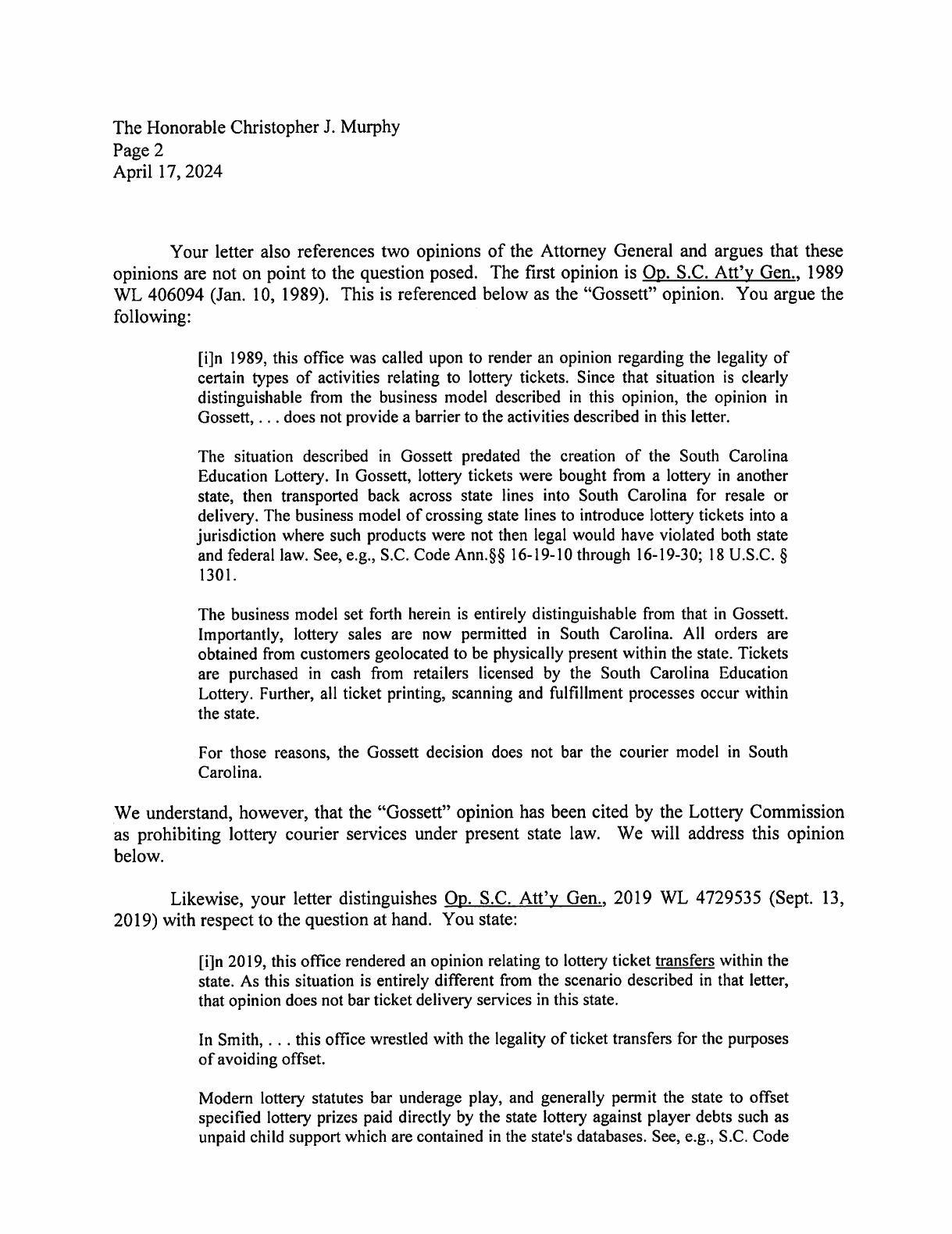
Likewise,
your
letter
distinguishes
Op.
S.C.
Att’y
Gen.,
2019
WL
4729535
(Sept.
13,
2019)
with
respect
to
the
question
at
hand.
You
state:
The
Honorable
Christopher
J.
Murphy
Page
2
April
17,
2024
Your
letter
also
references
two
opinions
of
the
Attorney
General
and
argues
that
these
opinions
are
not
on
point
to
the
question
posed.
The
first
opinion
is
Op.
S.C.
Atf
v
Gen.,
1989
WL
406094
(Jan.
10,
1989).
This
is
referenced
below
as
the
“Gossett”
opinion.
You
argue
the
following:
For
those
reasons,
the
Gossett
decision
does
not
bar
the
courier
model
in
South
Carolina.
[i]n
2019,
this
office
rendered
an
opinion
relating
to
lottery
ticket
transfers
within
the
state.
As
this
situation
is
entirely
different
from
the
scenario
described
in
that
letter,
that
opinion
does
not
bar
ticket
delivery
services
in
this
state.
In
Smith,
.
.
.
this
office
wrestled
with
the
legality
of
ticket
transfers
for
the
purposes
of
avoiding
offset.
Modem
lottery
statutes
bar
underage
play,
and
generally
permit
the
state
to
offset
specified
lottery
prizes
paid
directly
by
the
state
lottery
against
player
debts
such
as
unpaid
child
support
which
are
contained
in
the
state's
databases.
See,
e.g.,
S.C.
Code
[i]n
1989,
this
office
was
called
upon
to
render
an
opinion
regarding
the
legality
of
certain
types
of
activities
relating
to
lottery
tickets.
Since
that
situation
is
clearly
distinguishable
from
the
business
model
described
in
this
opinion,
the
opinion
in
Gossett,
. . .
does
not
provide
a
barrier
to
the
activities
described
in
this
letter.
The
situation
described
in
Gossett
predated
the
creation
of
the
South
Carolina
Education
Lottery.
In
Gossett,
lottery
tickets
were
bought
from
a
lottery
in
another
state,
then
transported
back
across
state
lines
into
South
Carolina
for
resale
or
delivery.
The
business
model
of
crossing
state
lines
to
introduce
lottery
tickets
into
a
jurisdiction
where
such
products
were
not
then
legal
would
have
violated
both
state
and
federal
law.
See,
e.g.,
S.C.
Code
Ann.§§
1
6-
1
9-
1
0
through
16-19-30;
18
U.S.C.
§
1301.
We
understand,
however,
that
the
“Gossett”
opinion
has
been
cited
by
the
Lottery
Commission
as
prohibiting
lottery
courier
services
under
present
state
law.
We
will
address
this
opinion
below.
The
business
model
set
forth
herein
is
entirely
distinguishable
from
that
in
Gossett.
Importantly,
lottery
sales
are
now
permitted
in
South
Carolina.
All
orders
are
obtained
from
customers
geolocated
to
be
physically
present
within
the
state.
Tickets
are
purchased
in
cash
from
retailers
licensed
by
the
South
Carolina
Education
Lottery.
Further,
all
ticket
printing,
scanning
and
fulfillment
processes
occur
within
the
state.
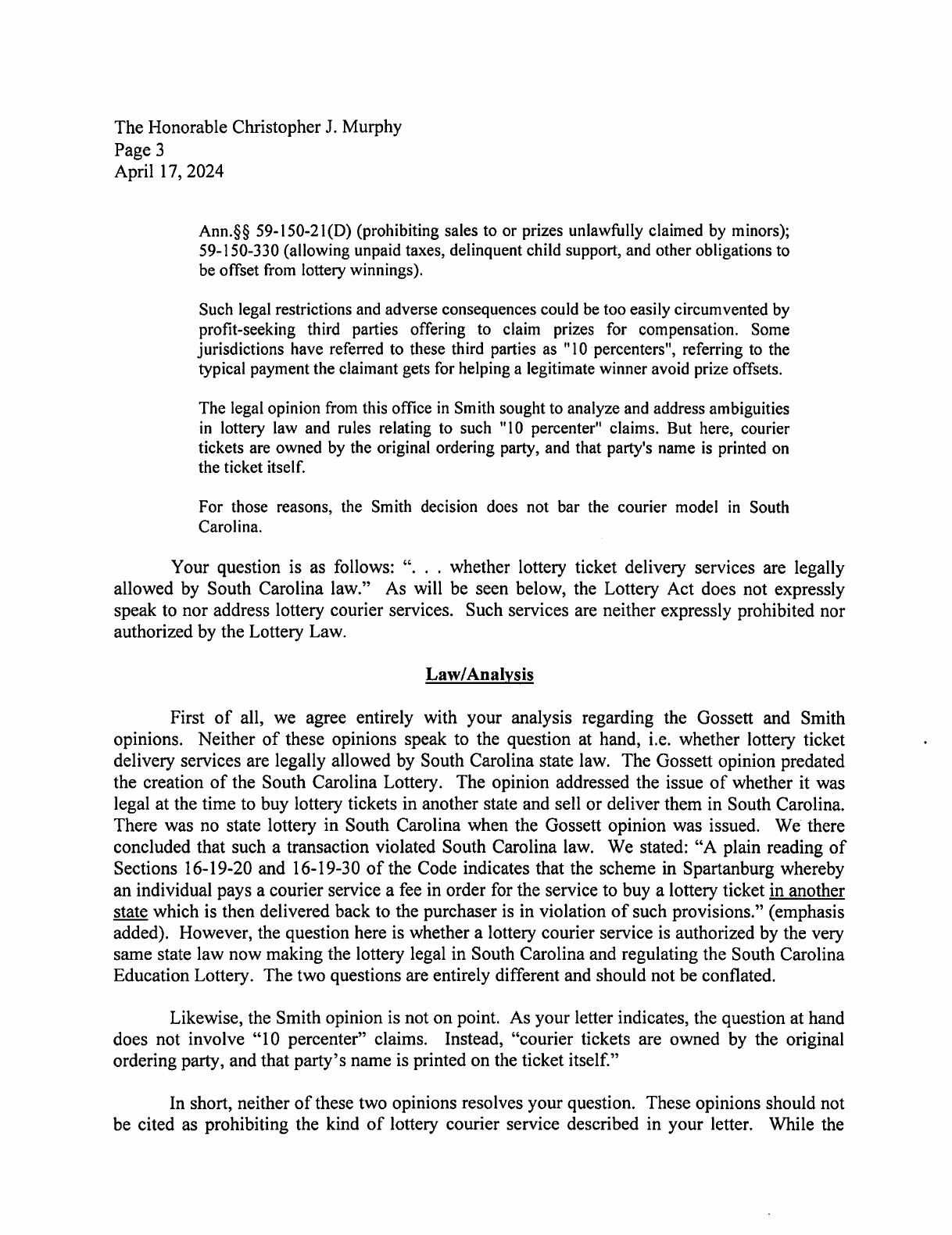
Law/Analysis
In
short,
neither
of
these
two
opinions
resolves
your
question.
These
opinions
should
not
be
cited
as
prohibiting
the
kind
of
lottery
courier
service
described
in
your
letter.
While
the
Likewise,
the
Smith
opinion
is
not
on
point.
As
your
letter
indicates,
the
question
at
hand
does
not
involve
“10
percenter”
claims.
Instead,
“courier
tickets
are
owned
by
the
original
ordering
party,
and
that
party’s
name
is
printed
on
the
ticket
itself.”
First
of
all,
we
agree
entirely
with
your
analysis
regarding
the
Gossett
and
Smith
opinions.
Neither
of
these
opinions
speak
to
the
question
at
hand,
i.e.
whether
lottery
ticket
delivery
services
are
legally
allowed
by
South
Carolina
state
law.
The
Gossett
opinion
predated
the
creation
of
the
South
Carolina
Lottery.
The
opinion
addressed
the
issue
of
whether
it
was
legal
at
the
time
to
buy
lottery
tickets
in
another
state
and
sell
or
deliver
them
in
South
Carolina.
There
was
no
state
lottery
in
South
Carolina
when
the
Gossett
opinion
was
issued.
We
there
concluded
that
such
a
transaction
violated
South
Carolina
law.
We
stated:
“A
plain
reading
of
Sections
16-19-20
and
16-19-30
of
the
Code
indicates
that
the
scheme
in
Spartanburg
whereby
an
individual
pays
a
courier
service
a
fee
in
order
for
the
service
to
buy
a
lottery
ticket
in
another
state
which
is
then
delivered
back
to
the
purchaser
is
in
violation
of
such
provisions.”
(emphasis
added).
However,
the
question
here
is
whether
a
lottery
courier
service
is
authorized
by
the
very
same
state
law
now
making
the
lottery
legal
in
South
Carolina
and
regulating
the
South
Carolina
Education
Lottery.
The
two
questions
are
entirely
different
and
should
not
be
conflated.
Your
question
is
as
follows:
“.
. .
whether
lottery
ticket
delivery
services
are
legally
allowed
by
South
Carolina
law.”
As
will
be
seen
below,
the
Lottery
Act
does
not
expressly
speak
to
nor
address
lottery
courier
services.
Such
services
are
neither
expressly
prohibited
nor
authorized
by
the
Lottery
Law.
The
Honorable
Christopher
J.
Murphy
Page
3
April
17,
2024
Such
legal
restrictions
and
adverse
consequences
could
be
too
easily
circumvented
by
profit-seeking
third
parties
offering
to
claim
prizes
for
compensation.
Some
jurisdictions
have
referred
to
these
third
parties
as
"10
percenters",
referring
to
the
typical
payment
the
claimant
gets
for
helping
a
legitimate
winner
avoid
prize
offsets.
The
legal
opinion
from
this
office
in
Smith
sought
to
analyze
and
address
ambiguities
in
lottery
law
and
rules
relating
to
such
"10
percenter"
claims.
But
here,
courier
tickets
are
owned
by
the
original
ordering
party,
and
that
party's
name
is
printed
on
the
ticket
itself.
Ann.§§
59-1
50-21(D)
(prohibiting
sales
to
or
prizes
unlawfully
claimed
by
minors);
59-150-330
(allowing
unpaid
taxes,
delinquent
child
support,
and
other
obligations
to
be
offset
from
lottery
winnings).
For
those
reasons,
the
Smith
decision
does
not
bar
the
courier
model
in
South
Carolina.
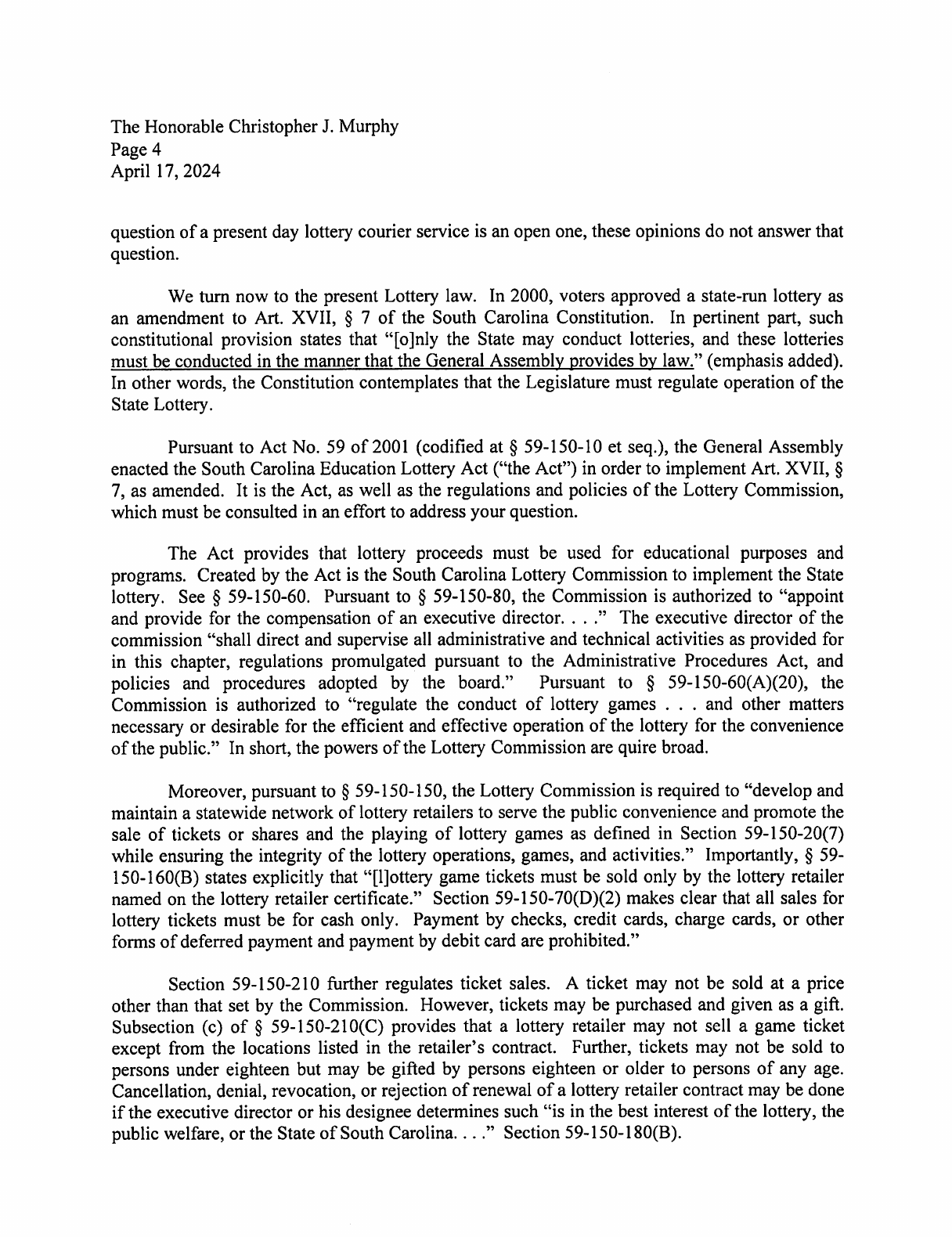
Moreover,
pursuant
to
§
59-150-150,
the
Lottery
Commission
is
required
to
“develop
and
maintain
a
statewide
network
of
lottery
retailers
to
serve
the
public
convenience
and
promote
the
sale
of
tickets
or
shares
and
the
playing
of
lottery
games
as
defined
in
Section
59-150-20(7)
while
ensuring
the
integrity
of
the
lottery
operations,
games,
and
activities.”
Importantly,
§
59-
150-1
60(B)
states
explicitly
that
“[l]ottery
game
tickets
must
be
sold
only
by
the
lottery
retailer
named
on the
lottery
retailer
certificate.”
Section
59-150-70(D)(2)
makes
clear
that
all
sales
for
lottery
tickets
must
be
for
cash
only.
Payment
by
checks,
credit
cards,
charge
cards,
or
other
forms
of
deferred
payment
and
payment
by
debit
card
are
prohibited.”
question
of
a
present
day
lottery
courier
service
is
an
open
one,
these
opinions
do
not
answer
that
question.
Pursuant
to
Act
No.
59
of
2001
(codified
at
§
59-150-10
et
seq.),
the
General
Assembly
enacted
the
South
Carolina
Education
Lottery
Act
(“the
Act”)
in
order
to
implement
Art.
XVII,
§
7,
as
amended.
It
is
the
Act,
as
well
as
the
regulations
and
policies
of
the
Lottery
Commission,
which
must
be
consulted
in
an
effort
to
address
your
question.
We
turn
now
to
the
present
Lottery
law.
In
2000,
voters
approved
a
state-run
lottery
as
an
amendment
to
Art.
XVII,
§
7
of
the
South
Carolina
Constitution.
In
pertinent
part,
such
constitutional
provision
states
that
“[ojnly
the
State
may
conduct
lotteries,
and
these
lotteries
must
be
conducted
in
the
manner
that
the
General
Assembly
provides
by
law.”
(emphasis
added).
In
other
words,
the
Constitution
contemplates
that
the
Legislature
must
regulate
operation
of
the
State
Lottery.
Section
59-150-210
further
regulates
ticket
sales.
A
ticket
may
not
be
sold
at
a
price
other
than
that
set
by
the
Commission.
However,
tickets
may
be
purchased
and
given
as
a
gift.
Subsection
(c)
of
§
59-
150-21
0(C)
provides
that
a
lottery
retailer
may
not
sell
a
game
ticket
except
from
the
locations
listed
in
the
retailer’s
contract.
Further,
tickets
may
not
be
sold
to
persons
under
eighteen
but
may
be
gifted
by
persons
eighteen
or
older
to
persons
of
any
age.
Cancellation,
denial,
revocation,
or
rejection
of
renewal
of
a
lottery
retailer
contract
may
be
done
if
the
executive
director
or
his
designee
determines
such
“is
in
the
best
interest
of
the
lottery,
the
public
welfare,
or
the
State
of
South
Carolina.
. .
.”
Section
59-
150-
180(B).
The
Honorable
Christopher
J.
Murphy
Page
4
April
17,
2024
The
Act
provides
that
lottery
proceeds
must
be
used
for
educational
purposes
and
programs.
Created
by
the
Act
is
the
South
Carolina
Lottery
Commission
to
implement
the
State
lottery.
See
§
59-150-60.
Pursuant
to
§
59-150-80,
the
Commission
is
authorized
to
“appoint
and
provide
for
the
compensation
of
an
executive
director.
.
.
.”
The
executive
director
of
the
commission
“shall
direct
and
supervise
all
administrative
and
technical
activities
as
provided
for
in
this
chapter,
regulations
promulgated
pursuant
to
the
Administrative
Procedures
Act,
and
policies
and
procedures
adopted
by
the
board.”
Pursuant
to
§
59-150-60(A)(20),
the
Commission
is
authorized
to
“regulate
the
conduct
of
lottery
games
. . .
and
other
matters
necessary
or
desirable
for
the
efficient
and
effective
operation
of
the
lottery
for
the
convenience
of
the
public.”
In
short,
the
powers
of
the
Lottery
Commission
are
quire
broad.
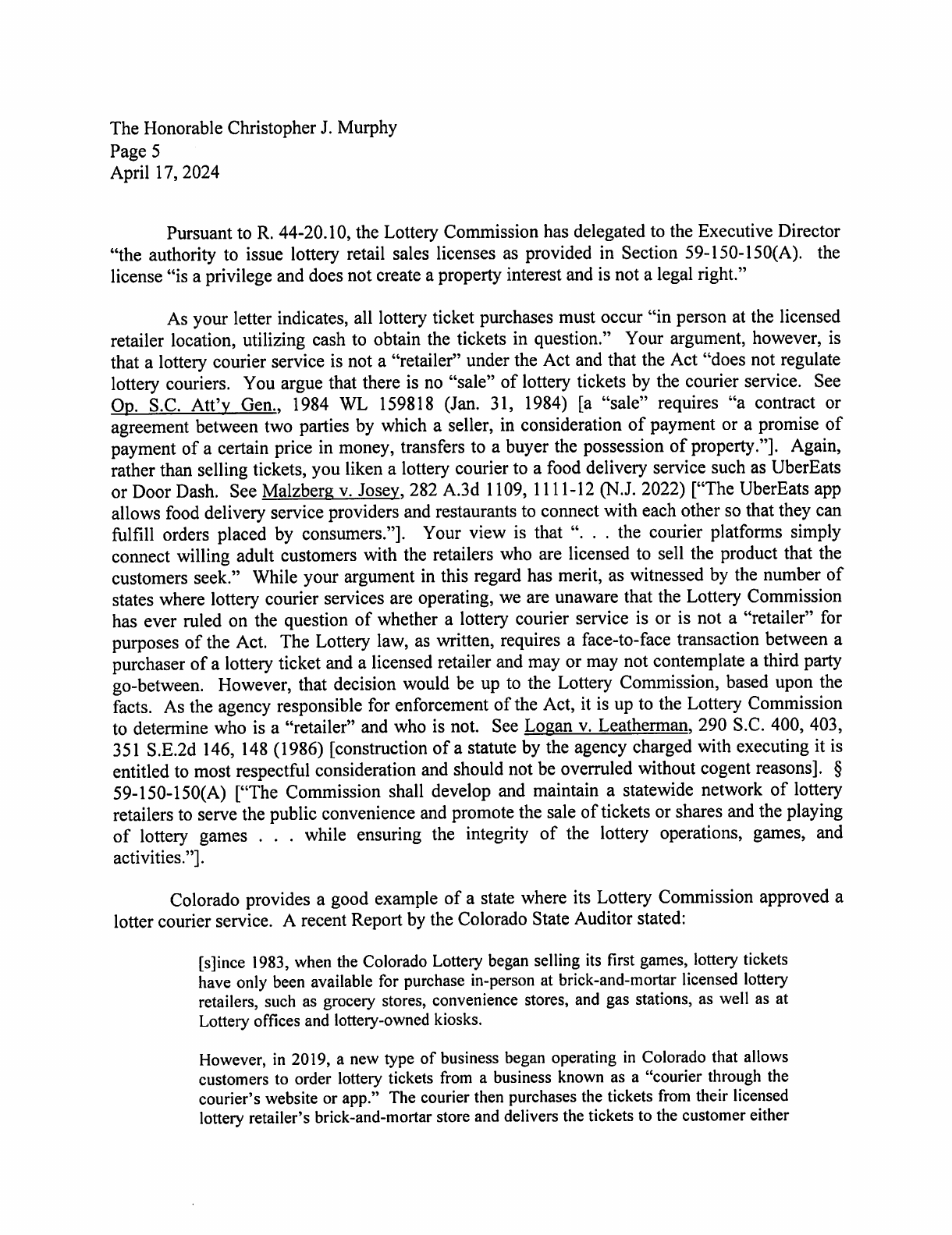
As
your
letter
indicates,
all
lottery
ticket
purchases
must
occur
“in
person
at
the
licensed
retailer
location,
utilizing
cash
to
obtain
the
tickets
in
question.”
Your
argument,
however,
is
that
a
lottery
courier
service
is
not
a
“retailer”
under
the
Act
and
that
the
Act
“does
not
regulate
lottery
couriers.
You
argue
that
there
is
no
“sale”
of
lottery
tickets
by
the
courier
service.
See
Op.
S.C.
Att’y
Gen.,
1984
WL
159818
(Jan.
31,
1984)
[a
“sale”
requires
“a
contract
or
agreement
between
two
parties
by
which
a
seller,
in
consideration
of
payment
or
a
promise
of
payment
of
a
certain
price
in
money,
transfers
to
a
buyer
the
possession
of
property.”].
Again,
rather
than
selling
tickets,
you
liken
a
lottery
courier
to
a
food
delivery
service
such
as
UberEats
or
Door
Dash.
See
Malzberg
v.
Josey,
282
A.3d
1109,
1111-12
(N.J.
2022)
[“The
UberEats
app
allows
food
delivery
service
providers
and
restaurants
to
connect
with
each
other
so
that
they
can
fulfill
orders
placed
by
consumers.”].
Your
view
is
that
“.
.
.
the
courier
platforms
simply
connect
willing
adult
customers
with
the
retailers
who
are
licensed
to
sell
the
product
that
the
customers
seek.”
While
your
argument
in
this
regard
has
merit,
as
witnessed
by
the
number
of
states
where
lottery
courier
services
are
operating,
we
are
unaware
that
the
Lottery
Commission
has
ever
ruled
on
the
question
of
whether
a
lottery
courier
service
is
or
is
not
a
“retailer”
for
purposes
of
the
Act.
The
Lottery
law,
as
written,
requires
a
face-to-face
transaction
between
a
purchaser
of
a
lottery
ticket
and
a
licensed
retailer
and
may
or
may
not
contemplate
a
third
party
go-between.
However,
that
decision
would
be
up to the
Lottery
Commission,
based
upon
the
facts.
As
the
agency
responsible
for
enforcement
of
the
Act,
it
is
up
to
the
Lottery
Commission
to
determine
who
is
a
“retailer”
and
who
is
not.
See
Logan
v.
Leatherman,
290
S.C.
400,
403,
351
S.E.2d
146,
148
(1986)
[construction
of
a
statute
by
the
agency
charged
with
executing
it
is
entitled
to
most
respectful
consideration
and
should
not
be
overruled
without
cogent
reasons].
§
59-
150-1
50(A)
[“The
Commission
shall
develop
and
maintain
a
statewide
network
of
lottery
retailers
to
serve
the
public
convenience
and
promote
the
sale
of
tickets
or
shares
and
the
playing
of
lottery
games
. .
.
while
ensuring
the
integrity
of
the
lottery
operations,
games,
and
activities.”].
The
Honorable
Christopher
J.
Murphy
Page
5
April
17,
2024
Colorado
provides
a
good
example
of
a
state
where
its
Lottery
Commission
approved
a
letter
courier
service.
A
recent
Report
by
the
Colorado
State
Auditor
stated:
[s]ince
1983,
when
the
Colorado
Lottery
began
selling
its
first
games,
lottery
tickets
have
only
been
available
for
purchase
in-person
at
brick-and-mortar
licensed
lottery
retailers,
such
as
grocery
stores,
convenience
stores,
and
gas
stations,
as
well
as
at
Lottery
offices
and
lottery-owned
kiosks.
However,
in
2019,
a
new
type
of
business
began
operating
in
Colorado
that
allows
customers
to
order
lottery
tickets
from
a
business
known
as
a
“courier
through
the
courier’s
website
or
app.”
The
courier
then
purchases
the
tickets
from
their
licensed
lottery
retailer’s
brick-and-mortar
store
and
delivers
the
tickets
to
the
customer
either
Pursuant
to
R.
44-20.10,
the
Lottery
Commission
has
delegated
to
the
Executive
Director
“the
authority
to
issue
lottery
retail
sales
licenses
as
provided
in
Section
59-
150-
150(A).
the
license
“is
a
privilege
and
does
not
create
a
property
interest
and
is
not
a
legal
right.”
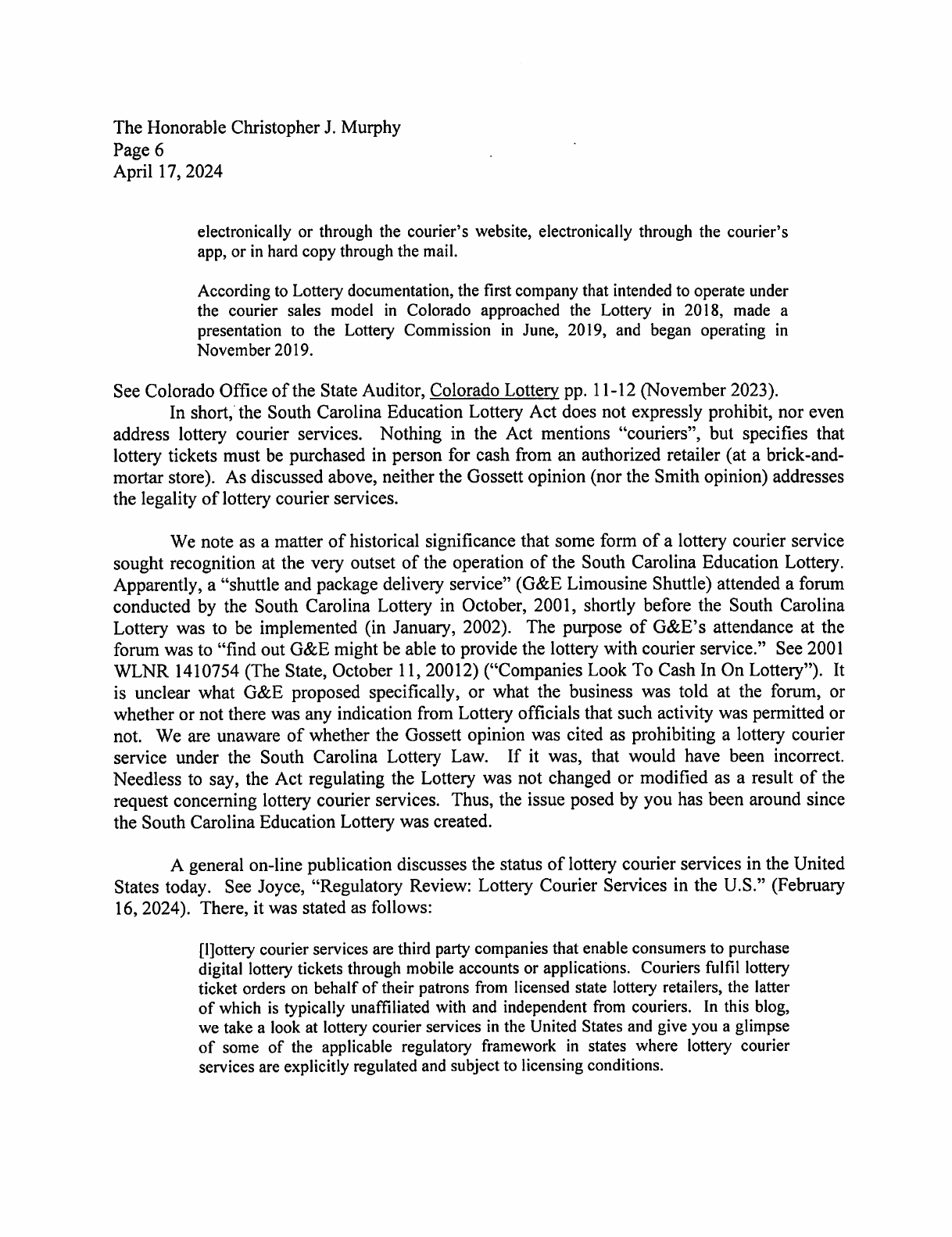
See
Colorado
Office
of
the
State
Auditor,
Colorado
Lottery
pp.
11-12
(November
2023).
In
short,
the
South
Carolina
Education
Lottery
Act
does
not
expressly
prohibit,
nor
even
address
lottery
courier
services.
Nothing
in
the
Act
mentions
“couriers”,
but
specifies
that
lottery
tickets
must
be
purchased
in
person
for
cash
from
an
authorized
retailer
(at
a
brick-and-
mortar
store).
As
discussed
above,
neither
the
Gossett
opinion
(nor
the
Smith
opinion)
addresses
the
legality
of
lottery
courier
services.
A
general
on-line
publication
discusses
the
status
of
lottery
courier
services
in
the
United
States
today.
See
Joyce,
“Regulatory
Review:
Lottery
Courier
Services
in
the
U.S.”
(February
16,
2024).
There,
it
was
stated
as
follows:
electronically
or
through
the
courier’s
website,
electronically
through
the
courier’s
app,
or
in
hard
copy
through
the
mail.
The
Honorable
Christopher
J.
Murphy
Page
6
April
17,
2024
[IJottery
courier
services
are
third
party
companies
that
enable
consumers
to
purchase
digital
lottery
tickets
through
mobile
accounts
or
applications.Couriers
fulfil
lottery
ticket
orders
on
behalf
of
their
patrons
from
licensed
state
lottery
retailers,
the
latter
of
which
is
typically
unaffiliated
with
and
independent
from
couriers.
In
this
blog,
we
take
a
look
at
lottery
courier
services
in
the
United
States
and
give
you
a
glimpse
of
some
of
the
applicable
regulatory
framework
in
states
where
lottery
courier
services
are
explicitly
regulated
and
subject
to
licensing
conditions.
According
to
Lottery
documentation,
the
first
company
that
intended
to
operate
under
the
courier
sales
model
in
Colorado
approached
the
Lottery
in
2018,
made
a
presentation
to
the
Lottery
Commission
in
June,
2019,
and
began
operating
in
November
2019.
We
note
as
a
matter
of
historical
significance
that
some
form
of
a
lottery
courier
service
sought
recognition
at
the
very
outset
of
the
operation
of
the
South
Carolina
Education
Lottery.
Apparently,
a
“shuttle
and
package
delivery
service”
(G&E
Limousine
Shuttle)
attended
a
forum
conducted
by
the
South
Carolina
Lottery
in
October,
2001,
shortly
before
the
South
Carolina
Lottery
was
to
be
implemented
(in
January,
2002).
The
purpose
of
G&E’s
attendance
at
the
forum
was
to
“find
out
G&E
might
be
able
to
provide
the
lottery
with
courier
service.”
See
2001
WLNR
1410754
(The
State,
October
11,
20012)
(“Companies
Look
To
Cash
In
On
Lottery”).
It
is
unclear
what
G&E
proposed
specifically,
or
what
the
business
was
told
at
the
forum,
or
whether
or
not
there
was
any
indication
from
Lottery
officials
that
such
activity
was
permitted
or
not.
We
are
unaware
of
whether
the
Gossett
opinion
was
cited
as
prohibiting
a
lottery
courier
service
under
the
South
Carolina
Lottery
Law.
If
it
was,
that
would
have
been
incorrect.
Needless
to
say,
the
Act
regulating
the
Lottery
was
not
changed
or
modified
as
a
result
of
the
request
concerning
lottery
courier
services.
Thus,
the
issue
posed
by
you
has
been
around
since
the
South
Carolina
Education
Lottery
was
created.
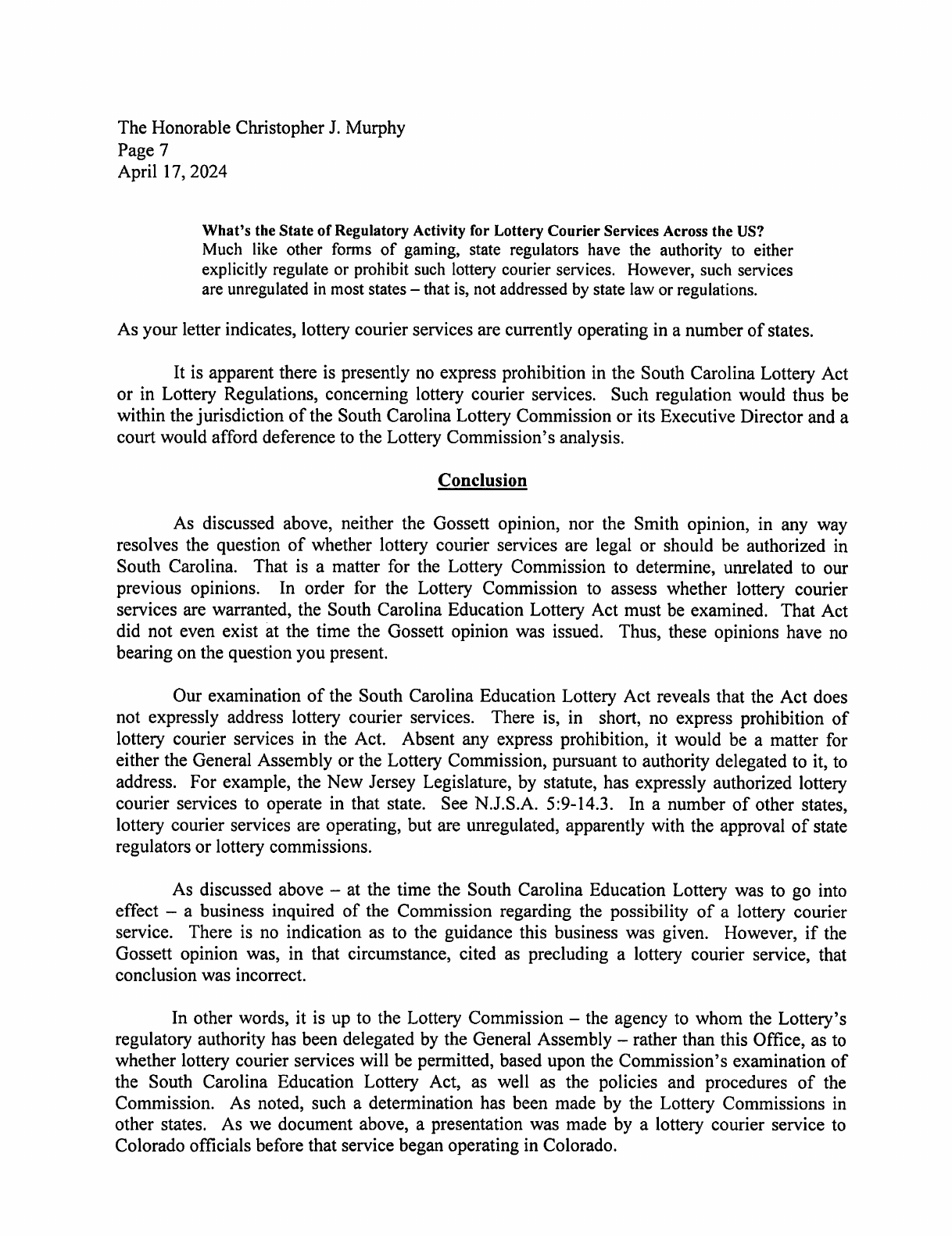
As
your
letter
indicates,
lottery
courier
services
are
currently
operating
in
a
number
of
states.
Conclusion
In
other
words,
it
is
up
to
the
Lottery
Commission
-
the
agency
to
whom
the
Lottery’s
regulatory
authority
has
been
delegated
by
the
General
Assembly
-
rather
than
this
Office,
as
to
whether
lottery
courier
services
will
be
permitted,
based
upon
the
Commission’s
examination
of
the
South
Carolina
Education
Lottery
Act,
as
well
as
the
policies
and
procedures
of
the
Commission.
As
noted,
such
a
determination
has
been
made
by
the
Lottery
Commissions
in
other
states.
As
we
document
above,
a
presentation
was
made
by
a
lottery
courier
service
to
Colorado
officials
before
that
service
began
operating
in
Colorado.
As
discussed
above
-
at
the
time
the
South
Carolina
Education
Lottery
was
to
go
into
effect
-
a
business
inquired
of
the
Commission
regarding
the
possibility
of
a
lottery
courier
service.
There
is
no
indication
as
to
the
guidance
this
business
was
given.
However,
if
the
Gossett
opinion
was,
in
that
circumstance,
cited
as
precluding
a
lottery
courier
service,
that
conclusion
was
incorrect.
Our
examination
of
the
South
Carolina
Education
Lottery
Act
reveals
that
the
Act
does
not
expressly
address
lottery
courier
services.
There
is,
in
short,
no
express
prohibition
of
lottery
courier
services
in
the
Act.
Absent
any
express
prohibition,
it
would
be
a
matter
for
either
the
General
Assembly
or
the
Lottery
Commission,
pursuant
to
authority
delegated
to
it,
to
address.
For
example,
the
New
Jersey
Legislature,
by
statute,
has
expressly
authorized
lottery
courier
services
to
operate
in
that
state.
See
N.J.S.A.
5:9-14.3.
In
a
number
of
other
states,
lottery
courier
services
are
operating,
but
are
unregulated,
apparently
with
the
approval
of
state
regulators
or
lottery
commissions.
It
is
apparent
there
is
presently
no
express
prohibition
in
the
South
Carolina
Lottery
Act
or
in
Lottery
Regulations,
concerning
lottery
courier
services.
Such
regulation
would
thus
be
within
the
jurisdiction
of
the
South
Carolina
Lottery
Commission
or
its
Executive
Director
and
a
court
would
afford
deference
tothe
Lottery
Commission’s
analysis.
The
Honorable
Christopher
J.
Murphy
Page
7
April
17,
2024
What’s
the
State
of
Regulatory
Activity
for
Lottery
Courier
Services
Across
the
US?
Much
like
other
forms
of
gaming,
state
regulators
have
the
authority
to
either
explicitly
regulate
or
prohibit
such
lottery
courier
services.
However,
such
services
are
unregulated
in
most
states
-
that
is,
not
addressed
by
state
law
or
regulations.
As
discussed
above,
neither
the
Gossett
opinion,
nor
the
Smith
opinion,
in
any
way
resolves
the
question
of
whether
lottery
courier
services
are
legal
or
should
be
authorized
in
South
Carolina.
That
is
a
matter
for
the
Lottery
Commission
to
determine,
unrelated
to
our
previous
opinions.
In
order
for
the
Lottery
Commission
to
assess
whether
lottery
courier
services
are
warranted,
the
South
Carolina
Education
Lottery
Act
must
be
examined.
That
Act
did
not
even
exist
at
the
time
the
Gossett
opinion
was
issued.
Thus,
these
opinions
have
no
bearing
on
the
question
you
present.

The
Honorable
Christopher
J.
Murphy
Page
8
April
17,
2024
Robert
DrCook
Solicitor
General
In
summary,
the
South
Carolina
Lottery
Commission
would
need
to
resolve
the
factual
issue
of
whether
a
lottery
courier
is
more
akin
to
a
“retailer”
under
the
Act
or
an
“UberEats”
delivery
service.
This
Office
cannot
make
such
a
factual
determination
in
an
opinion.
The
Commission
would
also
adjudge
whether
a
lottery
courier
service
is
consistent
with
the
Act’s
purpose.
In
other
words,
any
opinion
by
this
Office
as
to
whether
a
lottery
courier
service
may
operate
in
South
Carolina
would,
in
effect,
supersede
the
Lottery
Commission’s
regulatory
authority
under
the
Act.
A
court
will
give
deference
to
the
Commission
as
the
agency
which
enforces
the
Act.
Logan,
supra.
However,
we
respectfully
request
that
our
1989
Gossett
opinion
not
be
used
as
part
of
any
decision
by
the
Lottery
Commission.
Sincerely,
